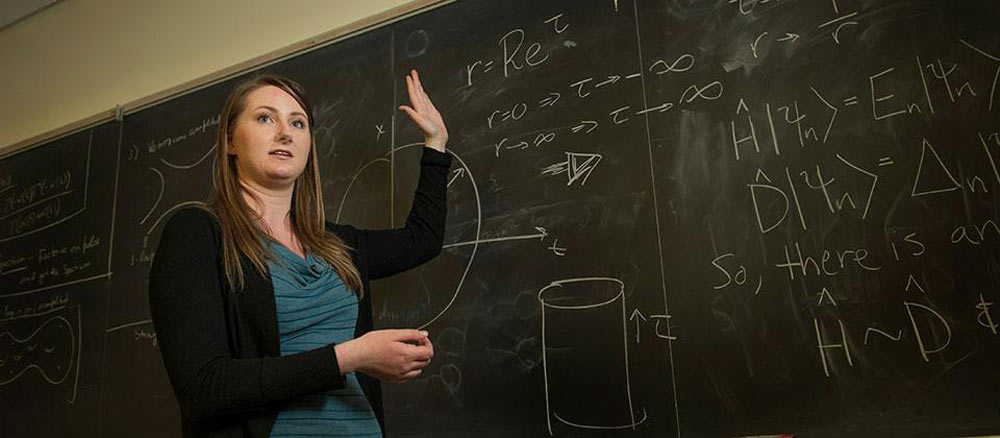
Rachel Houtz
More information
Doctoral student, Theoretical Particle Physics
Rachel Houtz enjoys challenging problems, and studying theoretical particle physics gives her plenty to tackle. But one “not fun part” is feeling lonely and that you don’t belong — things she struggled with, especially as an undergraduate female in physics.
“Science is really difficult in a vacuum without any social influence,” said Houtz. “You can overcome that by building a strong community.”
Making connections
A Women in Sciences and Engineering mentoring program helped Houtz connect with other women in STEM on campus, matching her with a professor and an undergraduate student for bi-weekly meetings through an academic year. It’s been so beneficial that the three continue to meet informally now that the program ended.
“Science is really difficult in a vacuum without any social influence. You can overcome that by building a strong community.”
“I got perspective outside of my department and learned about the types of strategic moves I should be following in my career,” said Houtz. “At the same time, I was able to pay it back to the community and guide the undergraduate.”
Houtz is also active in the student-run Diversity and Inclusion in Physics program, a resource for students to discuss experiences and what they want to see changed within the department.
Commitment to community
As a TA, Houtz noticed that undergraduate physics courses didn’t have discussion sections, something she found crucial to combat feelings of isolation in her own undergraduate experience. So, she created the H-Bar activity, twice weekly discussion sections welcoming all physics students to bring homework and get help from graders over cookies and coffee.
A play on the concept of a coffee bar and the “H” physics construct, H-Bar has been so successful that the Physics department added it to the curriculum and gave Houtz a TA-ship to run it. One of the topics already covered in her discussions? Diversity inclusion in physics.
On “mansplaining”
“Connect, collaborate, do homework together — these are all baby ways to build support networks that you really lean on once you get to more advanced study. It’s really important to be a part of a community when you start to get those feelings of doubt.”
Houtz says she’s never observed “mansplaining” — explaining something, typically a man to a woman, in a condescending or patronizing manner — from faculty, but she has experienced it firsthand from peers who assume a hierarchy that isn’t there, or that she isn’t current on the latest research. “Just having a word for it makes it a lot easier to explain when it’s happening,” said Houtz. “I’m assertive about it, but it can be really frustrating. Having a support system ameliorates the temptation to internalize it and take it as an indication of my abilities.”
Advice for women entering the STEM field
Houtz would like to see more opportunities for women in STEM on campus to meet and talk across departments without agenda. She encourages women starting out in STEM to get to know one another, even if they feel they don’t have much in common. “Connect, collaborate, do homework together — these are all baby ways to build support networks that you really lean on once you get to more advanced study,” said Houtz. “It’s really important to be a part of a community when you start to get those feelings of doubt.”
Houtz will complete her doctoral degree in theoretical particle physics in August, then head to the University of Madrid for a two-year post-doctoral research position. Follow her on LinkedIn.